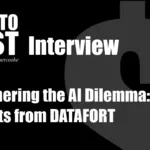In today’s technology-driven world, the Middle East is embracing the power of data science and artificial intelligence (AI) as catalysts for economic growth and innovation. This region, known for its ambitious goals and thirst for development, is harnessing cutting-edge technologies to transform its landscape. From Dubai’s groundbreaking “One Million Arab Coders” initiative to Lebanon’s improved eGovernment AI Readiness Index ranking, countries in the Middle East are leveraging data science and AI to drive efficiency, foster innovation, and create new job opportunities.
Dubai, always at the forefront of visionary initiatives, launched the “One Million Arab Coders” program in 2017, marking it as the largest of its kind in the Arab world. This ambitious project aims to equip one million individuals with coding skills, empowering them to excel in the digital age. By nurturing a culture of innovation and providing accessible educational opportunities, Dubai is positioning itself as a regional hub for tech talent. Just envision a future where every Arab coder possesses the skills to shape the digital landscape, propelling the Middle East into a global digital powerhouse.
Data democratization, the practice of making data accessible to all, is a critical aspect of the digital revolution. However, it also presents risks regarding secrecy and privacy. To strike a balance, policy measures are needed to ensure responsible and ethical data use while promoting its widespread availability. By establishing independent research centers supported by universities, the Middle East can develop market-driven technologies and intelligent business solutions while safeguarding privacy concerns. Imagine a world where data is freely available, driving innovation and fostering a culture of transparency and collaboration.
Recognizing the transformative potential of AI, countries like the UAE and Saudi Arabia have implemented national strategies to accelerate its adoption and drive digital transformation. The UAE, in particular, appointed the world’s first Minister of State for Artificial Intelligence in 2017 and developed a comprehensive National Artificial Intelligence Strategy for 2031. These strategic initiatives pave the way for the integration of AI across various sectors, enhancing efficiency, fairness, fraud control, and more. Envision a future where AI seamlessly integrates into our daily lives, augmenting our decision-making processes and revolutionizing industries.
In Lebanon, the advancement of data science and AI is bolstered by the efforts of organizations like Dalil, a fact-checking platform that detects disinformation and false news in Arabic. By promoting accurate information and combating misinformation, Dalil contributes to the development of a reliable and trustworthy digital landscape. Imagine a world where fake news is a thing of the past, and reliable information is readily available at our fingertips.
The role of women in data science and AI is of great significance. Their strengths in communication, collaboration, and problem-solving contribute to better decision-making and effective teamwork. Recognizing this, the American University of Beirut organizes an annual event to promote women in data science (WiDS), showcasing their accomplishments and encouraging their participation in the field. Envision a future where women take the lead in data science and AI, driving innovation and shaping the digital landscape.
While progress is being made, challenges remain. Accessible databases are crucial for driving efficiency, quality, sustainability, and resilience. Open access to large datasets enables researchers, businesses, and policymakers to make informed decisions and develop innovative solutions. Civil society, think tanks, the private sector, and the media should advocate for changes in data access and usage, ensuring that data becomes a democratized resource for the benefit of all. Imagine a world where data is not confined to the hands of a few, but rather a shared resource that fosters collaboration and innovation.
Revamping educational programs to anticipate future jobs is another critical step. The World Economic Forum’s ‘Reskilling Revolution’ program aims to empower one billion people with better skills, education, and economic opportunity by 2030. By aligning educational curricula with the needs of the digital era, Middle Eastern countries can equip their workforce with the necessary skills to thrive in the rapidly evolving job market. Envision a future where individuals are prepared for the jobs of tomorrow, armed with the skills to navigate the digital landscape with confidence.
Establishing and replicating AI Hubs can create job opportunities and foster innovation ecosystems. These hubs, supported by government initiatives and partnerships with the private sector, become incubators for startups, research, and collaboration. By bringing together talent and resources, they create a fertile ground for technological advancements and economic growth. Envision a future where AI hubs are thriving centers of innovation, attracting talent from all corners of the world and driving economic prosperity.
In the face of the ever-growing digital divide, increasing data literacy among civil servants and the wider community is of paramount importance. Educational programs, workshops, and training initiatives can equip individuals with the skills needed to effectively leverage data, fostering data-driven decision-making processes in both the public and private sectors. Envision a world where data literacy is not limited to a select few but rather a widespread skill that empowers individuals and organizations to make informed choices.
However, embracing data science and AI in the Middle East is not without its challenges. Some leaders may be hesitant to adopt technologies and best practices that allow easy access, sharing, and analysis of data due to concerns over transparency and accountability. Overcoming these barriers requires inclusive laws that encourage women’s role in data science and artificial intelligence, as well as a reevaluation of digital transformation strategies to align with ambitious regional goals. Envision a future where leaders embrace the power of data science and AI, driving progress and propelling the Middle East to the forefront of the global digital revolution.
The Middle East is poised to join the Fourth Industrial Revolution and reap the benefits of data science and AI. With strategic initiatives, inclusive policies, and a focus on data literacy and education, the region can unlock its potential, driving economic growth and fostering innovation. As countries in the Middle East continue to make significant strides in this domain, they are positioning themselves as global players in the digital age. Envision a future where the Middle East is a thriving hub of technological advancements, leading the charge towards a brighter and more connected world.










